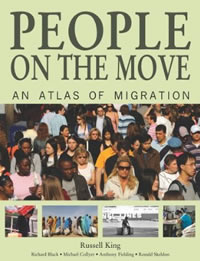Book Notes
 Russell King, et al., People on the Move; An Atlas of Migration (Berkeley: University of California Press, 2010), 128pp.
Russell King, et al., People on the Move; An Atlas of Migration (Berkeley: University of California Press, 2010), 128pp.
What do the following social factors all have in common: military security, climate change, the slave trade, religious persecution, economic need, ethnic cleansing, environmental catastrophes, brain drain, and political oppression? They are all causes and/or consequences of human migration. The five authors of this volume are colleagues at the University of Sussex Centre for Migration Research. The subject is admittedly complex, and hard data is often difficult if not impossible to obtain, but the results, as this book show, are fascinating.
This isn't a book you sit down and read from start to finish. You could linger on a page or two for an hour. The book is a combination of short narrative overviews that introduce hundreds of maps of highly specialized topics, all related to human migration. Human migration can be permanent or temporal, legal or illegal, international or internal, voluntary or involuntary, rural or urban, and by refugees or skilled workers.
The book contains all sorts of surprises that break stereotypes. In 2010, only three percent of the world's population were international migrants (although this small percentage still represents a large number). The largest single migration in the world right now is the 100 million Chinese who are moving internally from the country to the cities. The largest international migration of free people was the fifty million people whom moved from Europe to the United States during the nineteenth and early twentieth century. In Qatar, 87% of the population is composed of migrants. 85% of all "skilled" Jamaicans (those with tertiary education) live outside of their country. Overseas development assistance totals about $103 billion; but this pales in comparison to remittances of $250 billion by migrants back to their home country.
The Judeo-Christian story is based upon Abraham, a wanderer who "went out, not knowing where he was going." The Hebrews were forcibly enslaved and deported by Egypt, Assyria, and Babylon. They repatriated. Today there is a huge Jewish diaspora. This book puts into very interesting light the Biblical injunction: "The alien living with you must be treated as one of your native-born. Love him as yourself, for you were aliens in Egypt. I am the LORD your God" (Leviticus 19:34).


